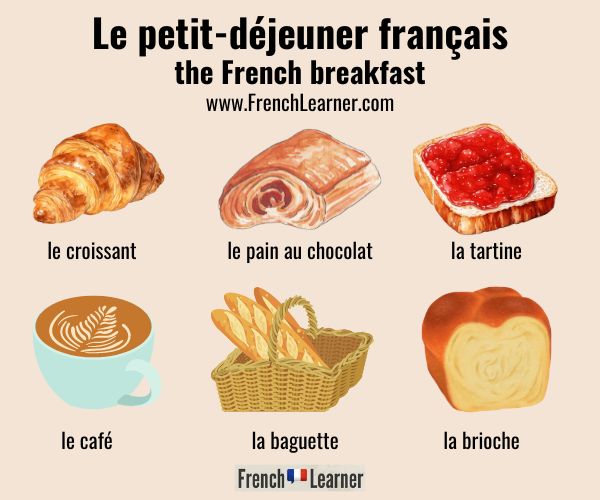A typical breakfast in France includes tartines (bread, often baguettes), confiture (jam), beurre (butter), café au lait or hot chocolate for dunking and juice. Weekends are often marked with a trip to the boulangerie (bakery) to fill up on croissants and other viennoiseries. But is there more to breakfast in France? To answer the question, we take a quick bite out of the petit-déjeuner typique.

Typical French breakfast
What to expect for breakfast in France
Un petit-déjeuner (or simply p’tit déj) means “a little lunch,” underlining how early France did not really care for breakfast.
Even today, few buy into the idea that breakfast is the most important meal of the day. Instead, France prefers to down tools and head for dinner at midday sharp, a meal that nearly everyone in the country agrees does matter.
That doesn’t mean mornings start with a couple of Gauloises washed down with the blackest of coffees, despite what French cinema wants us to believe.
Unsurprisingly, France collectively reaches for bread in the morning, typically topped with something sweet. Confitures (jams,) marmalade, honey, and the enduringly-popular Nutella hazelnut spread are preferred toppings. Butter is ever-present.
Bread is typically sliced into tartines. Day-old baguettes are sometimes toasted; because who has time to pop out and buy fresh bread before work.
Livening up French breakfasts are bread substitutes like brioche, pain grillé (toast), or biscotte (a rusk biscuit.) Supermarket sliced bread, pain de mie, may even appear, even if nobody admits to liking it.
That said, breakfast in France is impossible to pigeonhole. For example, recent surveys suggest more than half of France wakes to a bowl of cereal.
Breakfast in France on the weekend
Even at the weekend, breakfast plays second-fiddle to lunch. You won’t ever wake to the smell of fried bacon in France.
And if you crave French toast, good luck. As we’ve previously covered, French toast is not even French.
Instead, France goes all-in on a different sweet treat; viennoiseries, one of the lasting contributions to global breakfasts.
Viennoiseries include the top trio: croissants, pain au chocolat, and pain au raisin. Yet they also include other sugary, buttery baked products and regional specialties, like teeth-cracking kouign-amann or chausson aux pommes (a French-style apple pie.)
Named after the Austrian capital but utterly French, viennoiseries are found in every boulangerie (bakery).
But, as the calorie content suggests, they are not for daily consumption. Instead, the buttery, flaky delights serve a dual purpose.
On the one hand, they fill a convenience gap for people who skipped breakfast and need a convenient tidbit to tide them other.
On the other, they’re a treat for weekends and special occasions when everybody picks their favorites from the mouthwatering array at the local boulangerie.
Breakfast drinks in France are (sometimes) made for dunking
If one stereotype holds true, it is the French love of pulse-quickening coffee to kickstart the heart and the day. A touch of milk may be added to make a café au lait, but strong, black coffee is more widely consumed.
Starting the day with coffee is hardly unique. Far more unusual is the French habit of dunking bread in their coffee.
Although not everyone enjoys dunking bread, for some it’s a habit nurtured from childhood that started with the true dunking star, hot chocolate.
An eternal favorite, chocolat chaud is best served in a bowl without handles. Check before adding cereal, as the line between bowl and mug is non-existent. However, they are perfect for dipping brioche and training future generations to enjoy the more acquired taste of coffee-soaked bread.
Other French breakfast foods
Breakfast in France is not limited to bread and other baked goodies.
Canadian-style pancakes, gaufres (waffles,) oatmeal, fruit, and juice are increasingly appearing on French breakfast tables.
Alongside another French favorite, yogurt. Which also gets the bread dunking treatment, a ritual engrained in the French psyche.
What about eggs, you might wonder. They tend to be saved for later, meaning you’ll have to wait until the clock strikes 12 if you fancy an omelet or oeufs cocotte.
In short, even a big breakfast spread in France will be cold and ready to eat, with nary a slice of bacon to be seen or smelt.
Where to eat breakfast in France
While brunch (helpful known as le brunch) is increasingly popular, heading out for breakfast in France is virtually unheard of outside city centers.
Your best bet for lining your stomach before midday is a café or boulangerie. This partly explains why the deceptively humble croissant is such a success.
Readily available and easy to eat on the go, a moreish croissant is arguably the ultimate breakfast food. Filled with eggs and bacon, there is no debate!
If you fancy more than a croissant when venturing out for breakfast in France, a few essential words and phrases can make all the difference. Especially if you want to create your own taste of home with a gallic twist.

French breakfast vocabulary
- What time/where is breakfast served? À quelle heure/où est-ce que le petit déjeuner est servi?
- I’d like to have my breakfast. Je voudrais prendre mon petit déjeuner.
- This morning I’ll have… Ce matin, je prendrai…
- cereal des céréales
- An American-style breakfast un petit déjeuner américain
- bacon and eggs des oeufs au bacon
- a soft/hard boiled egg un oeuf dur à la coque mollet/dur
- fried eggs/scrambled eggs des oeufs au plat/brouillés
- ham and eggs des oeufs au jambon
- French toast du pain perdu/doré (Canada)
- waffles des gaufres
- pancakes/crepes des pancakes/des crêpes
- maple syrup sirop d’érable
- oatmeal des flocons/gruau d’avoine
- toast du pain grillé
- jam de la confiture
- marmalade de la marmelade
- butter du beurre
- As a drink I’ll have… Comme boisson, je prendrai…
- a fruit juice, apple juice, orange juice, grapefruit juice un jus de fruits/pomme/orange/pamplemousse
- a coffee un café
- a coffee with milk un café au lait
- a decaf coffee un café décaféiné
- tea with milk/lemon du thé au lait/citron
- honey du miel
- hot/cold milk du lait chaud/froid
- rolls des petit pains
- yogurt du yaourt

